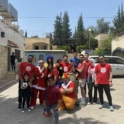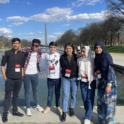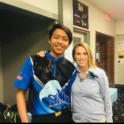West Bank YES alumni organized a GYSD event for orphaned children.
STORIES
YES Student and his ‘G-ma’ from Omaha Bridge Cultural Gap

Ebrahim Abdulsattar, (YES 2009-2010, Yemen, hosted by YFU in Omaha, NE) and his host grandmother.
Originally published on Omaha.com, by Erin Grace (World-Herald)
On the morning of Ebrahim’s college graduation, everyone at Ila Dean’s home bustled with excitement.
Frank brought home enough doughnuts to feed an army. Ila Dean jumped up to show Ebrahim’s black commencement robe, hanging off the kitchen cabinets. And a beaming Ebrahim made a phone call to his folks on the other side of the globe so they, too, could share in the joy.
It had all worked out. More than six years ago, Ebrahim was a bright Muslim teenager from Yemen who suddenly needed a place to live in Omaha. Ila Dean was the former Iowa farm girl in her late 70s who agreed to take in the stranger, and later pushed for him to come back to Nebraska, even paying his way. His parents had let their son go, knowing that they wouldn’t see him for years.
And now Ebrahim was graduating from the University of Nebraska at Omaha, with a job lined up the following Monday. He was launched. This was the prize.
But there was another reward, too: An unlikely connection between two people — bridging oceans, cultures and generations and offering hope for a world that, after the Paris attacks and San Bernardino shooting spree, seems more divided, more fearful than ever.
Ebrahim, 23, calls her his American grandmother.
Ila Dean, 85, calls him her investment for peace in the world.
“It’s been a blessing to know someone from another culture, especially a culture that is so maligned,” she said. “I’ve had acquaintances say terrible things. But I can’t possibly look at it that way. He’s a human being. He will make his mark on the world.”
***
Their paths crossed in the fall of 2009.
Ebrahim Abdulsattar was almost 16 — newly enrolled at Omaha Westside High School, but without a place to live.
Ila Dean Horn was a retired educator with a live-in friend and a spare basement bedroom.
A neighbor across the street knocked on her door. Could Ila Dean house a foreign exchange student for the school year? The boy’s original host family didn’t work out and he was staying with the neighbor. But the neighbor was already hosting an exchange student from Oman, and program rules prohibited housing both all year.
Ila Dean thought this was a joke. Good one! She and Frank were too old! She’d raised her kids and a grandchild.
But the neighbor pressed: This was urgent. Ebrahim might have to go back to Yemen. And he was a nice, bright kid who deserved this chance. Would Ila Dean at least come over and meet him?
* *
Later, Ila Dean thought about the polite boy she’d met and saw herself: a bright kid who, too, once was stuck.
Born in the Depression, she grew up on a hardscrabble Iowa farm, the oldest of nine children. Her mother worked so hard, was always tired, and teenage Ila Dean saw that and wanted something else for her life.
A neighbor saw Ila Dean’s name on an honor roll published in the local newspaper. She asked Ila Dean in for cookies and encouraged her to think about college.
College hadn’t been on the radar of a girl coming of age in postwar America with no way to pay for school. But the neighbor helped her get a Farm Bureau scholarship, and Ila Dean went to college.
For a year, anyway. Then her small-town school superintendent called with a job offer. He needed a fifth-grade teacher.
So she left college, took the job, married her high school sweetheart, helped put him through college and followed him to jobs until they planted themselves in Omaha.
They had three kids, but Ila Dean desperately wanted to finish her degree. Her husband wanted her at home — a tension that later led to their divorce.
Ila Dean managed: She went back to college, got her degree, ran a school library in Ralston, commuted to Lincoln for graduate school and ran the household. She later got a doctorate and taught college.
If her life taught her something, it was that you can be persistent and chart the path you want. But not alone. For her, it took that Iowa neighbor to recognize her potential, and it took mentors and teachers along the way.
So what to do about Ebrahim?
Ila Dean talked it over with Frank Frerich, a friend with whom she’d lived for 20 years. The next day Ila Dean went to her neighbor’s house and said: We’ll take him.
*
Straight away, Ila Dean gave him a key, and Ebrahim settled right into her ranch house in the Loveland neighborhood, near 80th and Pacific Streets.
He had his own bedroom, his own bathroom and the basement den. He also had surrogate grandparents who made his meals, drove him around, looked over his essays and went to his parent-teacher conferences at Westside.

Their tidy, loving home was a real port in the storm during a rough first semester. Ebrahim was overwhelmed: The sheer distance in geography and culture topped the list. He was 8,000 miles from home, and everything here was so different. Girls, for starters, at Westside. His school in Yemen had been boys-only. And despite a crash course in English in Yemen, he was struggling with the language — which made the coursework hard for a student accustomed to having things come more easily.
He knew it had taken a lot to get here and he wasn’t about to waste this chance. Ebrahim’s parents were professionals who had pushed him to apply for the U.S. government-sponsored student exchange program for high schoolers from predominantly Muslim countries.
They were so insistent on this opportunity that when a frustrated Ebrahim ripped up his application, his mother, Ruksana, a biology teacher, rescued it and sent it in anyway. His father, Walid, an engineer, told him to learn English well enough to boost his chances for attending a U.S. college someday.
So he had work to do.
And Ila Dean really helped. Oh, she wouldn’t write his papers. But she would proofread them, correct his grammar and always, always encourage him.
You can do it, Ebrahim!
By second semester, Ebrahim’s English had improved so much he discovered that his once-hard classes at Westside were easy.
He joined the band. He learned to bowl. He rode a horse. He played in the snow. He went skiing. He made friends.
When it was time to return home in May 2010, a crowd went to Eppley Airfield. And waved goodbye.
*
Ebrahim returned to Yemen changed. His family noticed it.
He had grown intellectually, culturally. He smiled a lot more. And he kept telling everyone how nice the people in Omaha were, how Ila Dean and Frank treated him like a grandson, how the Westside kids absorbed him into their circles, how much fun he’d had.
Ruksana and Walid felt relieved. They had made the right decision.
Ila Dean and Ebrahim kept in touch by email. He told her about returning to Yemen, about finishing high school, preparing for exams and figuring out what he wanted to do next. He was teaching English and hoping to save enough money to buy his parents a fancier TV.
She told him how the cascade of world events was making her concerned: an Arab Spring of uprisings against governments across North Africa and the Middle East, including Yemen. She asked: What are you going to do?
He had no answer for her. He did not know. Institutions were coming to a halt. No mail service. No jobs. No school.
I’m worried, Ila Dean would write. You need to get out of there. Can you come back to Omaha? Go to UNO? Live with us?
Of course Ebrahim wanted to return. But how?
Ila Dean did some homework. She made calls. She worked with UNO and the U.S. Embassy in Yemen. She got an affidavit from her bank proving she could support him.
Then she gave Ebrahim a long to-do list involving visas and applications. She sent him a $500 Visa card for fees. And she repeated her invitation, saying something to the effect of: Just get here. We’ll figure out the details later.
**
In the fall of 2012, Ebrahim returned.
He moved back into the space in Ila Dean’s basement. He enrolled at UNO and majored in management information systems, joining the honors program. He got grants, scholarships and jobs at school. Ila Dean covered the rest. He asked if he could pay her back. She simply said: Do this for someone else.
So he has said yes to every request for his help. Yes, he’d help build a database for Project Harmony, an Omaha nonprofit that serves abused children. Yes, he’d assist a local effort to film interviews with World War II veterans across the country for a documentary.
Just as he had at Westside, Ebrahim got involved at UNO. He helped his College of Information Science & Technology with recruitment efforts. As head of UNO’s Muslim Student Association, he organized speaker events. And he assumed an ambassador-type role of explaining his culture and faith to others.
Ebrahim biked to school until he got a car. Frank put him on his AARP insurance and helped him after Ebrahim had a wreck on Saddle Creek Road.
He kept a busy pace, home long enough to shower, sleep and eat. He kept Ila Dean apprised of his plans with notes he’d write in pencil, affectionately addressed to “G-ma.”
G-ma, I went to work.
G-ma, I went to a friend’s house.
G-ma, I’m keeping an eye on myself.
The last one is a joke between the two of them. It originated with a Family Circus cartoon, they explain, that shows one of the Keane kids telling his mother he’s OK because he’s keeping an eye on himself.
And he has, earning the respect of UNO officials. Hesham Ali, the dean of UNO’s College of Information Science & Technology, and Lucy Morrison, head of UNO’s honors program, describe him as a self-starter who digs in, works hard and is pretty universally liked. At the honors program banquet, Morrison said, Ebrahim had more people at his table than anyone else.
The two people who most wanted to celebrate his graduation milestone last month, Ebrahim’s parents, badly wanted to be here. But the turmoil in Yemen meant no more U.S. Embassy. Ruksana had traveled to Jordan to apply for travel visas, but she was denied.
Ebrahim would like to go home, but if he does, he probably couldn’t get back to Omaha. At least no time soon. His father has told him to wait until he has enough experience and money to help Yemen move forward. His mother is dying to hug him and worries about his safety.
But knowing Ebrahim is with Ila Dean eases her worry.
“I can feel how much his grandmother, Ila Dean as he called her, loves him and cares about him as I would,” Ruksana said in response to questions emailed to her. “For that and more we are so much thankful to that sweet lady. We appreciate all what she has done for Ebrahim.”
In turn, Ila Dean said she appreciates what Ebrahim has done for her. He’s enriched her life, she says. And he’s been extremely polite, extremely gracious and is full of gratitude. She rather likes his conservative Muslim faith — it’s meant no booze and no girls, less worry.
Some have raised an eyebrow about doing so much, but she says it is how she was raised. Her parents, poor as they were, took in the homeless during the Depression. She has shared her home with a grandson and with Frank. Even her ex-husband sometimes comes for dinner.
Ebrahim said he has encountered some hostility based on his nationality and faith, but he didn’t want to dwell on that. Overall, he said, his experience has been positive.
His first stay in Omaha was through a program approved by Congress in the wake of 9/11, intended to increase mutual understanding. As its co-sponsor, former U.S. Sen. Dick Lugar, R-Ind., has said: “It was very important to get to know students in Muslim countries and for them to know us.”
It’s how Ebrahim came to Ila Dean’s door. Of course she had to open it.
“I’ve got four great-grandchildren here and one on the way,” she said, “and I want them to have a better world.”
All photos courtesy of Omaha.com





